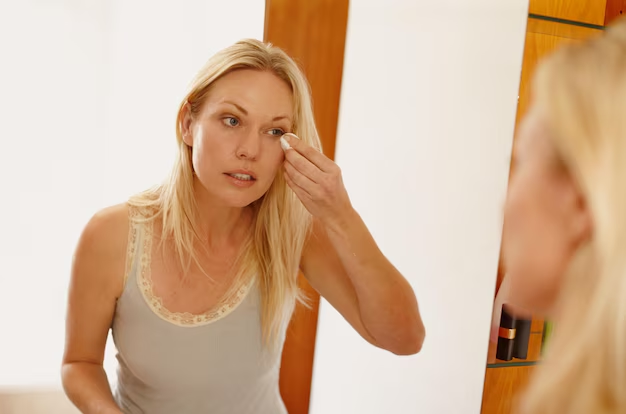Understanding Rosacea: Signs, Symptoms, and Next Steps
Every morning as you stumble out of bed and glance in the mirror, you might wonder why your cheeks are perpetually rosy. While a healthy glow is often embraced, persistent redness can sometimes be more than just a complexion quirk. This condition might be rosacea—a common but often misunderstood skin ailment that affects millions worldwide. If you’re asking, "How do I know if I have rosacea?" then read on for a comprehensive exploration of this skin concern.
What is Rosacea?
Rosacea is a chronic skin disorder that primarily impacts the face, leading to redness and visible blood vessels. Often mistaken for acne, eczema, or a skin allergy, it primarily affects middle-aged women with fair skin, but anyone can develop it. The precise cause of rosacea remains unknown, yet genetic, environmental, and lifestyle factors play a significant role in its development.
Key Characteristics of Rosacea:
- Facial Redness: Persistent flushing and redness in the central face, often resembling a sunburn.
- Visible Blood Vessels: Tiny, broken blood vessels become visible on the nose and cheeks.
- Bumps and Pimples: Small, red, pus-filled bumps often accompany the redness.
- Eye Irritation: Eyes can appear watery or bloodshot, and eyelid irritation is also common.
- Thickened Skin: In severe cases, the skin on the nose thickens (rhinophyma), leading to a bumpy appearance.
Recognizing the Symptoms
Understanding the signs is the first step in determining whether you might have rosacea. Here’s how you can identify it:
The Four Types of Rosacea
Rosacea can manifest in various forms, each with its distinct symptoms:
Erythematotelangiectatic Rosacea (ETR): Primarily characterized by redness and visible blood vessels. Stinging or burning sensations may also occur.
Papulopustular (Acne) Rosacea: Resembles acne with redness, swelling, and bumps accompanied by pus-filled pustules.
Phymatous Rosacea: Leads to skin thickening and an enlargement of skin, particularly noticeable on the nose.
Ocular Rosacea: Affects the eyes, making them red and irritated, leading to the feeling of a foreign body presence.
Do You Have These Triggers?
Certain triggers exacerbate rosacea flare-ups. Identifying and avoiding them can significantly help in managing symptoms:
- Spicy Foods and Alcohol: Both can cause temporary flushing and exacerbate redness.
- Heat and Sun Exposure: UV rays and hot weather tend to worsen the symptoms.
- Stress: Emotional distress often leads to an increase in rosacea symptoms.
- Skin Products: Harsh skincare products can trigger adverse reactions.
Self-Assessment Checklist
To better understand if your symptoms align with rosacea, consider this checklist:
- Do you experience persistent facial redness?
- Are bumps or pimples a frequent occurrence?
- Is there any burning or stinging sensation?
- Do you notice visible blood vessels on your skin?
- Does your skin react negatively to sun exposure or spicy foods?
If you find yourself nodding to several of these questions, it might be time to delve deeper into possible next steps.
Exploring Diagnosis Options
While online resources provide valuable insights, they can’t replace professional medical advice. If you're concerned about rosacea, consulting a dermatologist is a logical next step. Here's how a healthcare professional can assist:
Dermatological Evaluation
A dermatologist will perform a thorough examination of your skin and may ask about your symptoms, lifestyle, and family history. Since there aren't any specific tests for rosacea, diagnosis typically hinges on clinical observation.
Ruling Out Other Conditions
Rosacea shares symptoms with various dermatological conditions, so it's crucial to rule out other possibilities like acne, lupus, or eczema. A dermatologist may opt for skin biopsies or blood tests for a definitive diagnosis.
Discussion of Management Plans
Upon confirmation, your dermatologist may discuss various management strategies. While these aren’t treatments, they effectively control flare-ups and improve the quality of life:
- Topical Creams: These can reduce redness and inflammation by constricting blood vessels.
- Oral Medications: Antibiotics may be prescribed to manage the more severe symptoms.
- Laser Therapy: Helps reduce visible blood vessels and redness.
- Lifestyle Adjustments: Identify and avoid personal triggers, adopt a suitable skincare routine, and use sunscreen regularly.
Empowering Yourself with Knowledge
Knowledge is empowering, especially in managing a condition like rosacea. The more you understand your skin, the better equipped you are to make informed decisions.
Practical Skin Care Tips
- Gentle Cleansing: Use mild cleansers free of alcohol or irritants.
- Moisturize Regularly: Hydrate your skin to strengthen the natural barrier.
- Sun Protection: Apply a broad-spectrum sunscreen of at least SPF 30 daily.
- Mindful Makeup: Choose non-comedogenic makeup products that allow your skin to breathe.
Lifestyle Adjustments
- Stress Management: Incorporate relaxation techniques like meditation or yoga.
- Dietary Changes: Maintain a food diary to identify potential triggers.
- Routine Monitoring: Keep track of symptoms to better understand flare-up patterns.
Final Insights
Identifying rosacea involves a journey of recognizing symptoms, understanding triggers, and seeking professional advice. While living with rosacea may initially seem daunting, effective management strategies can lead to a fulfilling and confident lifestyle. Embrace the journey of self-care, and remember that help is always within reach.
Key Takeaways and Tips for Rosacea Management:
- Identify Symptoms: Look for persistent facial redness, visible vessels, and potential irritation.
- Consult a Dermatologist: Getting a professional opinion is crucial for accurate diagnosis.
- Avoid Known Triggers: Monitor and avoid foods, products, or situations that trigger symptoms.
- Adopt a Suitable Skincare Routine: Use gentle cleansers, moisturize often, and always wear sunscreen.
- Explore Treatment Options: Discuss possibilities like topical creams, medication, and therapies with your doctor.
🌞 Sun Protection: Never skip sunscreen!
🍔 Diet Matters: Keep track of foods that might trigger outbreaks.
🧴 Choose Wisely: Opt for skincare products that are gentle and suitable for sensitive skin.
🧘 Stay Calm and Relaxed: Practice stress-reducing activities regularly.
👁 Watch for Eye Symptoms: If eyes are affected, consult an ophthalmologist.
By taking steady, informed steps, you can manage rosacea effectively and lead a life that feels unrestricted by your skin condition.

